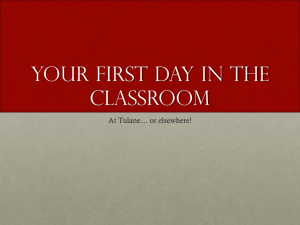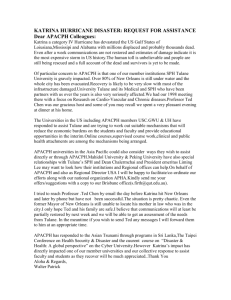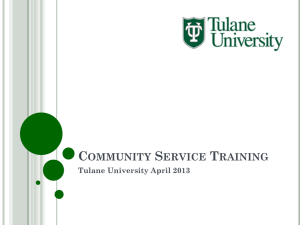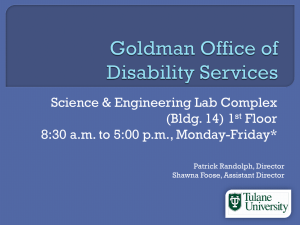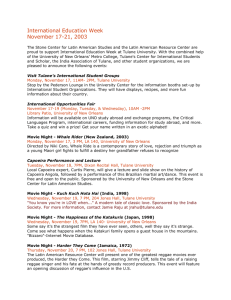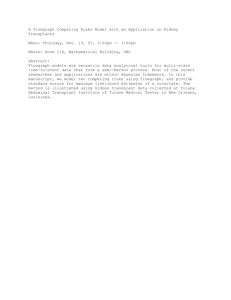46 Tulane University Law School
advertisement
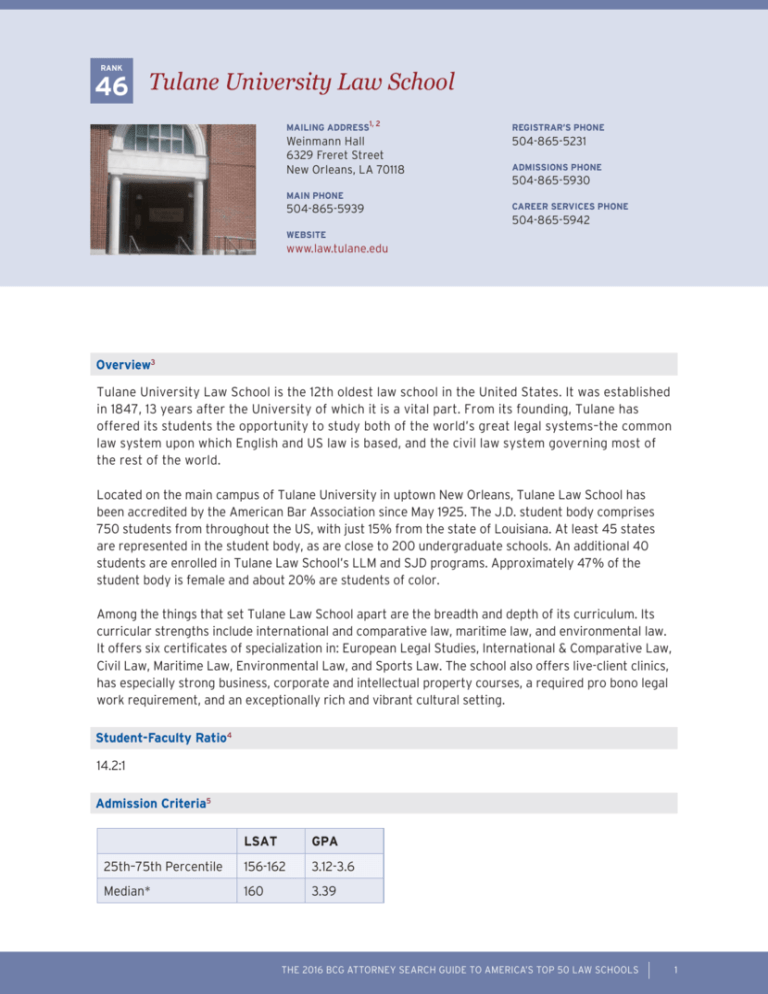
RANK 46 Tulane University Law School MAILING ADDRESS1, 2 REGISTRAR’S PHONE Weinmann Hall 6329 Freret Street New Orleans, LA 70118 504-865-5231 ADMISSIONS PHONE 504-865-5930 MAIN PHONE 504-865-5939 CAREER SERVICES PHONE 504-865-5942 WEBSITE www.law.tulane.edu Overview3 Tulane University Law School is the 12th oldest law school in the United States. It was established in 1847, 13 years after the University of which it is a vital part. From its founding, Tulane has offered its students the opportunity to study both of the world’s great legal systems–the common law system upon which English and US law is based, and the civil law system governing most of the rest of the world. Located on the main campus of Tulane University in uptown New Orleans, Tulane Law School has been accredited by the American Bar Association since May 1925. The J.D. student body comprises 750 students from throughout the US, with just 15% from the state of Louisiana. At least 45 states are represented in the student body, as are close to 200 undergraduate schools. An additional 40 students are enrolled in Tulane Law School’s LLM and SJD programs. Approximately 47% of the student body is female and about 20% are students of color. Among the things that set Tulane Law School apart are the breadth and depth of its curriculum. Its curricular strengths include international and comparative law, maritime law, and environmental law. It offers six certificates of specialization in: European Legal Studies, International & Comparative Law, Civil Law, Maritime Law, Environmental Law, and Sports Law. The school also offers live-client clinics, has especially strong business, corporate and intellectual property courses, a required pro bono legal work requirement, and an exceptionally rich and vibrant cultural setting. Student-Faculty Ratio4 14.2:1 Admission Criteria5 LSAT GPA 25th–75th Percentile 156-162 3.12-3.6 Median* 160 3.39 THE 2016 BCG ATTORNEY SEARCH GUIDE TO AMERICA’S TOP 50 LAW SCHOOLS 1 The above LSAT and GPA data pertain to the 2013 entering class. *Medians have been calculated by averaging the 25th- and 75th-percentile values released by the law schools and have been rounded up to the nearest whole number for LSAT scores and to the nearest one-hundredth for GPAs. Admission Statistics6 Approximate number of applications 2271 Number accepted 1044 Percentage accepted 46% The above admission details are based on 2013 data. Class Ranking and Grades7 The work of graduate students with law degrees from accredited US law schools is graded on a lettergrade scale, with quality points assigned as follows: A 4 A- 3.67 B+ 3.33 B 3 B- 2.67 C+ 2.33 C 2 C- 1.67 D 1 F 0 The work of graduate students with law degrees from schools outside of the United States is graded on the following scale: • • • • (E) Excellent - Outstanding performance (VG) Very Good - Very credible performance (R) Recommended - Acceptable performance (NR) Not Recommended - Unacceptable performance for which no credit will be given Grade Normalization (Curve)8 Minimum Grades Required (Based on May 2013 graduation class) Minimum grade required to fall within the top 10% of the class 3.715 Minimum grade required to fall within the top 25% of the class 3.574 Minimum grade required to fall within the top 33% of the class 3.525 THE 2016 BCG ATTORNEY SEARCH GUIDE TO AMERICA’S TOP 50 LAW SCHOOLS 2 Minimum grade required to fall within the top 50% of the class 3.379 Minimum grade required to fall within the top 75% of the class 3.065 Median GPA 3.367 Honors9 % of Class Receiving GPA Required # of Students Order of the Coif Top 10% 3.715 25 Summa cum laude 8.2% 3.750 - 4.00 20 Magna cum laude 27.5% 3.500-3.749 67 Cum laude 0 0 Awards10, 11 Name of Award Awarded for/to Civil Law Studies Award Established in 1983 by the Louisiana State Bar Association for the highest grade point average in civil law courses. Dean’s Medal For the highest grade point average during the third year. Edward A. Dodd Jr. Award In memory of Edward A. Dodd Jr., who received the LLM in Admiralty at Tulane in 1984, for the outstanding candidate for the degree of LLM in Admiralty. Faculty Medal For the highest grade point average in the entire course of three years in the School. General Maurice Hirsch Award Endowed by Mrs. Elise Newman Solomon to honor the life and achievement of General Hirsch for the graduating student who has contributed most distinctively and constructively to university or community needs. Haber J. McCarthy Environmental Law Award Created in memory of Haber McCarthy, a 1985 graduate, for the graduating student who has completed selected environmental law courses with the highest grade point average. Brian P. McSherry Community Service Award Endowed in memory of Brian McSherry, a 1981 graduate, for the graduating student who has demonstrated the greatest dedication to the Law School’s community service program. George Dewey Nelson Memorial Award For the highest grade point average in common law subjects throughout the three years of law study. Tulane Tax Institute Award For the greatest distinction in the study of taxation. John Minor Wisdom Award Endowed in 1987 by the former law clerks of the Honorable John Minor Wisdom for an outstanding JD candidate who has demonstrated excellence in academic work and in writing ability, has contributed selflessly to the law school community, and who has accepted a federal or state judicial clerkship after graduation. THE 2016 BCG ATTORNEY SEARCH GUIDE TO AMERICA’S TOP 50 LAW SCHOOLS 3 Other Awards and Honors Name of Award Awarded for/to American Bankruptcy Institute Medal for Excellence in Bankruptcy Studies For excellence in the study of bankruptcy law. American Bar Association Section of Urban, State and Local Government Law For the highest grades in Land Use Planning and State and Local Government. Admiralty Writing Competition For the best paper on an admiralty subject. Cuthbert S. Baldwin Award For the highest grade in Introduction to Civil Law Property. CALI Excellence for the Future Awards For the student in each law school course achieving the top grade. Clark Boardman Callaghan Book Awards For the winners of the Senior and Junior Trial and Appellate competitions. Ray Forrester Award For the highest mark in Constitutional Law I. Mitchell Franklin Award For the highest mark in Contracts I. Rufus C. Harris Award in Torts For the highest mark in Torts. David L. Herman Awards For the highest grades in Obligations I and Legal Profession. James Cooke Johnson Scholarship For the member of the second-year class who attains the highest general average for the entire year. Samuel Lang Award For the highest grade in Labor Law. Law League of Louisiana Award For the member of the third-year class who has most improved his or her grade point average from the end of the first year. Monte M. Lemann Award For the highest mark in Conflict of Laws. Cullen R. Liskow Award For the highest mark in Oil and Gas Law. Edwin I. Mahoney Award For the highest mark in Criminal Law. Paul Morphy Jr. Memorial Award For the highest mark in Civil Law Real Estate Transactions. Leonard H. Rosenson Prize For the highest mark in Common Law Real Estate Transactions. Ralph J. Schwarz Award For the highest grade in Equity Remedies. Cicero C. Sessions Trial Advocacy Award For the highest grades in Trial Advocacy. Allen Smith Prize For the highest grade in Successions, Donations, and Trusts. Walter J. Suthon Jr. Award For the highest mark in Security Rights. THE 2016 BCG ATTORNEY SEARCH GUIDE TO AMERICA’S TOP 50 LAW SCHOOLS 4 Joseph Modeste Sweeney Scholarship For the highest grade point average in the first year. West Publishing Co. Prizes For the top grades in each section of Contracts I, Torts, Property, Criminal Law, and Civil Procedure. National Association of Women Lawyers Award For a third-year student who has performed well in school and who shows promise of contributing to the advancement of women in society. Yippy Award For the highest grade in Civil Law Property II. Association for Women Attorneys Award For the outstanding student in the Domestic Violence Clinic. Journals12 The Tulane Environmental Law Journal is a biannual legal periodical produced and edited by students with the support of the faculty and administration. Tulane is recognized as having one of the strongest environmental law programs in the country, and TELJ has been rated as one of the top 15 environmental law journals. TELJ contains timely articles written by professors and practitioners, as well as commentary on recent cases written by journal members. TELJ is committed to featuring scholarly articles that rigorously analyze a broad range of environmental issues affecting individuals, communities, and the nation at large.13 The Tulane European & Civil Law Forum is dedicated to offering scholarly and timely articles, comments, case notes, and book reviews that preserve and advance the civilian tradition and strengthen Louisiana’s links with Europe. Its Board of Contributing Editors is made up of 51 scholars from ten European countries and the United States. The forum is edited by faculty.14 The Tulane Journal of International and Comparative Law was founded as an outgrowth of Tulane’s historical tradition as a signpost in the academic world for international and comparative law. The Journal is dedicated to discussing and debating all facets of international law, from human rights to transnational commerce to the historical evolution of current global law. The Journal is one of the leading law reviews in international and comparative law.15 The Tulane Journal of Law & Sexuality is the first and only student-edited law review in the country devoted solely to covering legal issues of interest to the lesbian, gay, bisexual, and transgender community on a wide variety of subjects, including constitutional, employment, family, health, insurance, and military law. The Journal addresses all of these issues and more with theoretical and practical articles by academicians, practitioners, and students. The Journal also publishes the winning article of the annual National LGBT Bar Association Michael Greenberg Student Writing Competition, an exciting competition that recognizes outstanding law student scholarship on legal issues affecting LGBT persons.16 The Tulane Journal of Technology & Intellectual Property is a student-edited, subscription-based, scholarly publication. Because the fields of technology and intellectual property law are by their very nature interdisciplinary fields of study, JTIP examines legal issues that highlight this burgeoning area of law. While publications have certainly included topics such as patents, copyrights, trademarks, and trade secrets, the Journal has also featured discussions concerning antitrust, information privacy, computer law, constitutional law, biotechnology, international medicine, contracts, torts, and a vast variety of other policy implications of law and technology in our society.17 THE 2016 BCG ATTORNEY SEARCH GUIDE TO AMERICA’S TOP 50 LAW SCHOOLS 5 The Tulane Law Review was established in 1916 as the Southern Law Quarterly. The first article, entitled “Louisiana: The Story of Its Legal System,” was written by the well-known comparatist John Wigmore. After publishing three Volumes, the Quarterly took an eleven-year hiatus due to the demands of the First World War. A recent Washington and Lee survey found that court citations of the Law Review place it in the top 7% of general U.S. law journals.18 The Tulane Maritime Law Journal is the preeminent student-edited law journal in the field of Admiralty and Maritime Law. Published semi-annually, each issue includes scholarly works written by academics, practitioners, and students concerning current topics in Admiralty and Maritime Law. In addition, the Journal publishes annual sections in Recent Developments and International Law for the United States and international community, as well as periodic symposia on relevant topical areas in the field. A recent Washington and Lee survey found that Tulane Maritime Law Journal is the top-cited maritime journal.19 The Sports Lawyers Journal is a national legal journal edited by students and published by the Sports Lawyers Association. Every member of the SLA, currently over 1000 practicing lawyers, professors, law students, and other professionals, receives the publication annually. Since the Journal is composed of articles authored by American, Canadian, and European law students, it provides a unique view of sports issues. First published in 1993, the Journal has enjoyed impressive success as the most widely read legal sports journal in the country. Students are selected for staff membership each year based on their performance in a writing competition open to second-year and third-year students.20 Moot Court21 Founded in 1929 by a small group of Tulane law students (including the legendary U.S. Fifth Circuit Judge John Minor Wisdom), the Tulane Moot Court counts among its alumni state and federal judges, members of Congress, Ambassadors, and state governors. Indeed, it is among the oldest, most revered, and most visible programs of its kind in the nation. Through numerous competitive and noncompetitive simulations of actual courtroom situations, the Tulane Moot Court empowers students with the opportunity to learn by doing direct and cross-examinations, opening and closing arguments, persuasive appellate presentations, negotiations, and arbitrations. The Tulane Moot Court Board oversees both intra- and inter-school competitions. Intra-school competitions are open to second- and third-year students at both trial and appellate levels. The intra-school competitions begin in the fall and continue through the academic year. The final rounds at the appellate level are held at the Louisiana Supreme Court and the US Court of Appeals for the Fifth Circuit. The final rounds of the trial competitions are held before Federal District Court judges. Winners of the Senior competitions (for third-year students) have their names engraved in gold on the marble tablets in the appellate moot court room in Weinmann Hall. Winners of the Junior competitions (for second-year students) are invited to join the Moot Court Board. Inter-school competitions in which Tulane typically competes include: Appellate Competitions • • • • • • Inter-American Sustainable Law Moot Court Competition ABA National Appellate Advocacy Competition Philip C. Jessup International Law Appellate Competition Pace Environmental Law Appellate Competition Judge John R. Brown Admiralty Appellate Competition Kaufman Securities Law Appellate Competition THE 2016 BCG ATTORNEY SEARCH GUIDE TO AMERICA’S TOP 50 LAW SCHOOLS 6 Trial Competitions • • • • • William W. Daniel National Invitational Mock Trial Competition Texas Young Lawyers’ Association National Trial Competition ATLA Student Trial Advocacy Competition National Ethics Trial Competition Louisiana Trial Competition Negotiation, Mediation, and Arbitration Competitions • American Bar Association Negotiation Competition • American Bar Association Mediation Competition • Willem C. Vis International Commercial Arbitration Competition Clinical Programs22 The Louisiana Supreme Court and federal courts in Louisiana authorize third-year law students to conduct a limited law practice for indigent clients. Under the direction of Tulane supervising faculty who are members of the Louisiana bar, students represent clients by investigating, preparing, and trying cases, or by becoming involved in administrative or legislative proceedings. In the Tulane law clinics, instruction is provided in a variety of contexts. For most of the clinics, students enroll in a seminar on lawyering skills, which addresses interviewing, counseling, negotiating, case planning, discovery, and motion practice. The emphasis is on lawyering skills that students will use after leaving law school. Students may also learn through simulated role performances, which are videotaped and critiqued. Finally, under faculty supervision, students represent individuals or organizations before trial or appellate courts, administrative agencies, or legislative bodies. Casework is organized around regular, individual weekly case review meeting between student and supervisor. At these meetings, student work is reviewed and case planning is undertaken based upon a discussion of goals, options, strategy choices, and underlying reasoning. Student-attorneys then execute the decisions arising out of the case review meeting, such as conducting client interviews, planning and executing fact investigation and formal discovery, drafting legal documents, and representing the client before courts, agencies, or the legislature. Some of the clinics include: • • • • • • Civil Litigation Clinic Criminal Litigation Clinic Domestic Violence Clinic Environmental Law Clinic Juvenile Litigation Clinic Legislative & Administrative Advocacy/The Public Law Center Placement Facts23 Starting Salaries (2012 Graduates Employed Full-Time) Private sector (25th-75th percentile) $60,000- $101,000 Private sector - Median $90,000 Public service - Median $50,000 THE 2016 BCG ATTORNEY SEARCH GUIDE TO AMERICA’S TOP 50 LAW SCHOOLS 7 Employment Details Graduates known to be employed at graduation 36.8% Graduates known to be employed nine months after graduation 72.1% Areas of Legal Practice Graduates Employed In Percentage Law Firms 47.9% Business and Industry 22.6% Government 10.3% Public Interest Organizations 4.7% Judicial Clerkships 12.4% Academia 2.1% Unknown 0% Externships/Internships Externships24 The Public Service Externship is an experiential learning course based in the real world. Student externs are placed in lawyering roles under the supervision of practicing lawyers or judges at work. There they gain expertise in problem solving, professionalism and ethics; develop lawyering skills; explore career interests; provide service to the community; and examine lawyers’ roles in ensuring justice for all. Three types of field placements are available: federal and state courts at the trial or appellate level, public interest and nonprofit organizations, and government offices at the federal, state or local level. Internships25 The Public Interest Law Foundation Grant Program enables students to explore careers in public interest law. The Program provides financial support for summer internships that would otherwise be unpaid. Students are eligible if they commit to work in the public interest for six to twelve weeks in legal positions representing individuals, causes, or organizations that suffer from a lack of adequate legal representation. Between 2005 and 2009, there were 109 PILF grant recipients that worked at eighty-nine organizations located across the United States and the world. Judicial internships are generally unpaid, volunteer positions, either part-time or full-time during the summer. Law students may serve as interns in a judge’s chambers after the first or second year of law school. Each summer approximately 50-60 first and second-year Tulane Law students work as judicial interns for federal and state court judges at a variety of courts across the United States. Student Organizations26 • • • • Alternative Dispute Resolution Law Society American Bar Association/Law Student Division American Constitution Society Asian-Pacific-American Law Students Association THE 2016 BCG ATTORNEY SEARCH GUIDE TO AMERICA’S TOP 50 LAW SCHOOLS 8 • • • • • • • • • • • • • • • • • • • • • • • • • • • • • • • • • • • • • • • • • Black Law Students Association Business Law Society Christian Legal Society Civil Law Society Criminal Law Society Disability and Health Law Society Eberhard P. Deutsch - International Law Society Entertainment and Art Law Society Environmental & Energy Law Society Environmental Law Journal Federal Bar Association Federalist Society Global Brigades Graduate Lawyers at Tulane Honor Board Human Rights Law Society Jewish Law Student Association La Alianza Lambda Law Alliance Law Students for Reproductive Justice Law Women’s Association Maritime Law Journal Maritime Law Society Military Law Society Moot Court National Lawyers Guild - Tulane Chapter Phi Alpha Delta Public Interest Law Foundation Real Estate Law Society Sports Law Society Sports Lawyers Journal Student Animal Legal Defense Fund Student Bar Association Technology and Intellectual Property Society Tulane Journal of International and Comparative Law Tulane Journal of Law and Sexuality Tulane Journal of Technology and Intellectual Property Tulane Law ReVieux Performing Arts Society Tulane Law Review Tulane University Legal Assistance Program VITA Program References 1. 2. 3. 4. 5. 6. 7. http://www.law.tulane.edu/tlsabout/index.aspx?id=168 http://registrar.tulane.edu/ http://www.law.tulane.edu/tlsabout/index.aspx http://premium.usnews.com/best-graduate-schools/top-law-schools/tulane-university-03068 http://premium.usnews.com/best-graduate-schools/top-law-schools/tulane-university-03068/admissions http://premium.usnews.com/best-graduate-schools/top-law-schools/tulane-university-03068/admissions http://www.law.tulane.edu/tlsAcademicprograms/index.aspx?id=1728 THE 2016 BCG ATTORNEY SEARCH GUIDE TO AMERICA’S TOP 50 LAW SCHOOLS 9 8. 9. 10. 11. 12. 13. 14. 15. 16. 17. 18. 19. 20. 21. 22. 23. 24. http://www.nalplawschoolsonline.org/ndlsdir_search_results.asp?lscd=71904&yr=2014 http://www.nalplawschoolsonline.org/ndlsdir_search_results.asp?lscd=71904&yr=2014 http://www.law.tulane.edu/tlsstudentlife/index.aspx?id=3550 http://www.law.tulane.edu/tlsstudentlife/index.aspx?id=3554 http://www.law.tulane.edu/tlsstudentlife/index.aspx?id=618 http://www.law.tulane.edu/tlsjournals/enviro/index.aspx?id=4306 http://www.law.tulane.edu/tlsjournals/jecl/index.aspx?id=3934 http://www.law.tulane.edu/tlsjournals/tjicl/index.aspx?id=4032 http://www.law.tulane.edu/tlsjournals/tlas/ http://www.law.tulane.edu/tlsjournals/jtip/page.aspx?id=17935 http://www.tulanelawreview.org/history/ http://www.tulanemaritimejournal.org/about/ http://www.law.tulane.edu/tlsjournals/slj/index.aspx?id=3822 http://www.law.tulane.edu/tlsStudentLife/index.aspx?id=1886 http://www.law.tulane.edu/tlsAcademicPrograms/index.aspx?id=1752 http://premium.usnews.com/best-graduate-schools/top-law-schools/tulane-university-03068/career-prospects http://www.law.tulane.edu/PublicInterest/index.aspx?id=11862 25. http://www.law.tulane.edu/PublicInterest/index.aspx?id=10590 26. http://www.law.tulane.edu/tlsStudentLife/orgs_index.aspx?ekmensel=52_submenu_0_link_2 THE 2016 BCG ATTORNEY SEARCH GUIDE TO AMERICA’S TOP 50 LAW SCHOOLS 10
